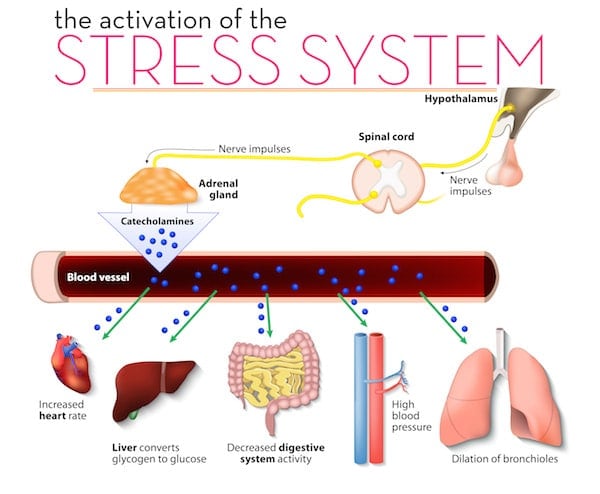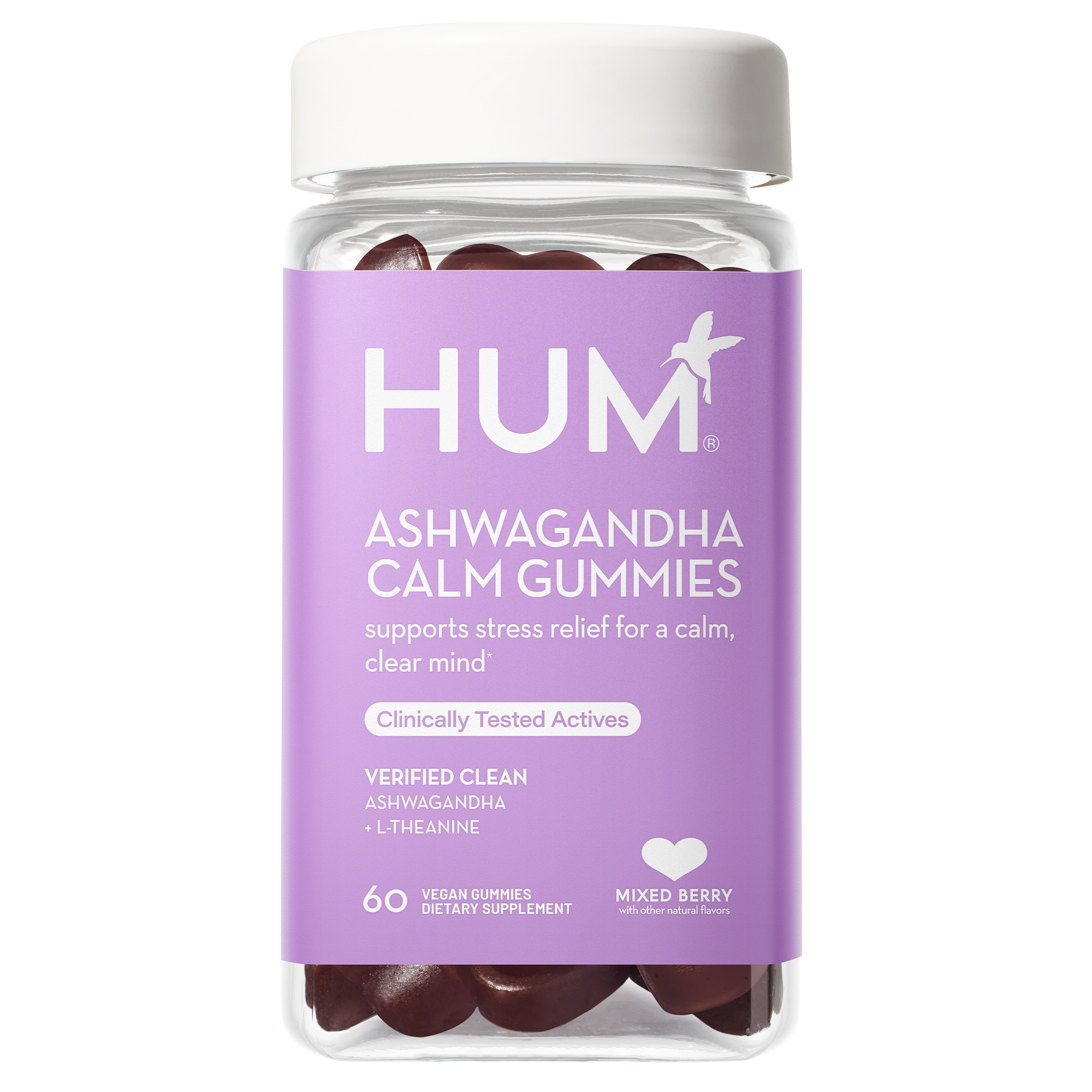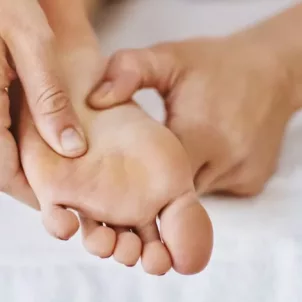A Harvard poll found that 75% of Americans report experiencing high to moderate levels of stress. Of those, 25% are experiencing high levels of stress (reported as an eight on a 10-point scale.) Yikes.
It’s an alarming statistic, especially when considering the toll stress takes on your health, well-being, and appearance. That’s why we wanted to share these four ways stress can affect your skin and beauty. We also offer up a list of recommendations for reducing and combating stressful situations.
 Your amygdala (your brain’s emotional response center) signals to the hypothalamus (your brain’s command center—or if you’ve seen Pixar’s Inside Out, “the Headquarters”). The HQ then communicate through your nervous system to determine whether to fight or take flight.
During this process, the hypothalamus signals the adrenal glands, which respond by launching catecholamines (a group of chemicals including adrenaline) into the bloodstream. Adrenaline leads to a faster heartbeat, increased blood pressure, rapid breathing. Furthermore, extra oxygen is directed to the brain to increase alertness. Adrenaline also triggers the release of glucose and stored fats to supply extra energy across the body.
It all occurs in the blink of an eye as your initial, visceral response to a stressor. As your surge of adrenaline dies down, your hormonal response is activated and cortisol is released. Chronic low-level stress elevates cortisol levels in the body, and can lead to a plethora of negative health effects.
Growing research is looking not only at the effects of stress on your health, but also on your skin, body, and appearance. One recent study even found that “men and women became significantly more attractive to potential partners if they had lower tension levels than their rivals.” In essence, stress levels seemed to correlate to levels of attraction.
Your amygdala (your brain’s emotional response center) signals to the hypothalamus (your brain’s command center—or if you’ve seen Pixar’s Inside Out, “the Headquarters”). The HQ then communicate through your nervous system to determine whether to fight or take flight.
During this process, the hypothalamus signals the adrenal glands, which respond by launching catecholamines (a group of chemicals including adrenaline) into the bloodstream. Adrenaline leads to a faster heartbeat, increased blood pressure, rapid breathing. Furthermore, extra oxygen is directed to the brain to increase alertness. Adrenaline also triggers the release of glucose and stored fats to supply extra energy across the body.
It all occurs in the blink of an eye as your initial, visceral response to a stressor. As your surge of adrenaline dies down, your hormonal response is activated and cortisol is released. Chronic low-level stress elevates cortisol levels in the body, and can lead to a plethora of negative health effects.
Growing research is looking not only at the effects of stress on your health, but also on your skin, body, and appearance. One recent study even found that “men and women became significantly more attractive to potential partners if they had lower tension levels than their rivals.” In essence, stress levels seemed to correlate to levels of attraction.
 In addition to these herbs, certain foods can help reduce cortisol levels, thereby cutting down on negative signs of stress.
In addition to these herbs, certain foods can help reduce cortisol levels, thereby cutting down on negative signs of stress.
How Your Body Responds to Stress
To understand the way stress affects beauty, skin, and health, it makes sense to begin with your body’s physiological response. Here’s a quick rundown on what happens in your brain and body when stress begins. Your amygdala (your brain’s emotional response center) signals to the hypothalamus (your brain’s command center—or if you’ve seen Pixar’s Inside Out, “the Headquarters”). The HQ then communicate through your nervous system to determine whether to fight or take flight.
During this process, the hypothalamus signals the adrenal glands, which respond by launching catecholamines (a group of chemicals including adrenaline) into the bloodstream. Adrenaline leads to a faster heartbeat, increased blood pressure, rapid breathing. Furthermore, extra oxygen is directed to the brain to increase alertness. Adrenaline also triggers the release of glucose and stored fats to supply extra energy across the body.
It all occurs in the blink of an eye as your initial, visceral response to a stressor. As your surge of adrenaline dies down, your hormonal response is activated and cortisol is released. Chronic low-level stress elevates cortisol levels in the body, and can lead to a plethora of negative health effects.
Growing research is looking not only at the effects of stress on your health, but also on your skin, body, and appearance. One recent study even found that “men and women became significantly more attractive to potential partners if they had lower tension levels than their rivals.” In essence, stress levels seemed to correlate to levels of attraction.
Your amygdala (your brain’s emotional response center) signals to the hypothalamus (your brain’s command center—or if you’ve seen Pixar’s Inside Out, “the Headquarters”). The HQ then communicate through your nervous system to determine whether to fight or take flight.
During this process, the hypothalamus signals the adrenal glands, which respond by launching catecholamines (a group of chemicals including adrenaline) into the bloodstream. Adrenaline leads to a faster heartbeat, increased blood pressure, rapid breathing. Furthermore, extra oxygen is directed to the brain to increase alertness. Adrenaline also triggers the release of glucose and stored fats to supply extra energy across the body.
It all occurs in the blink of an eye as your initial, visceral response to a stressor. As your surge of adrenaline dies down, your hormonal response is activated and cortisol is released. Chronic low-level stress elevates cortisol levels in the body, and can lead to a plethora of negative health effects.
Growing research is looking not only at the effects of stress on your health, but also on your skin, body, and appearance. One recent study even found that “men and women became significantly more attractive to potential partners if they had lower tension levels than their rivals.” In essence, stress levels seemed to correlate to levels of attraction.
4 ways stress affects beauty, skin, and health
To more deeply understand the link between stress and appearance, we’re looking at 4 key skin and beauty concerns that stress can exacerbate. Plus: solutions to prevent stress from taking its toll.1. Acne and Breakouts
A HUM study of 1,000 consumers on habits linked to acne found that consistent stress was one of the leading factors for those struggling with acne. There are a few different ways in which it can occur. Research has looked into the role of stress on inflammation, finding that “experimental data support the idea that the nervous system and stress affect inflammatory skin conditions in humans.” These researchers looked at how stress can cause the skin’s nerve endings to release a greater amount of chemicals that inflame the skin. As described above, the stress hormone, cortisol, can play a role in skin inflammation. When cortisol releases into your bloodstream, oil production increases. When your oil glands produce sebum and mix with dead skin cells, your pores get blocked and bacteria has room to thrive. The foundation for breakouts results.2. Dry Skin and Redness
Similar to the many ways stress can induce and exacerbate breakouts, dry skin, redness, and irritation can also become problems. One study found that “acute psychosocial stress [such as a job interview] and sleep deprivation stress disrupts skin barrier function homeostasis in women.” Thus, your skin becomes more sensitive and susceptible to natural irritants and damage. In addition, stress causes blood vessels to dilate as more oxygen travels through the body in order to maintain alertness. Skin can become dehydrated and redness, dryness, and inflammation can ensue.3. Weight Change
A Harvard report on understanding the stress response describes how elevated cortisol levels can have unintended physiological changes on the body. For instance, cortisol increases appetite as well as the storage of unused nutrients as fat so that the body restores energy necessary during the stress response. At the same time, however, a hormone released during stress (called CRH) turns off the appetite. It means stress can also cause weight loss for others. An indirect route to weight gain is seen in the common response to stress of reaching for salty, sugary, and processed foods. While it can sometimes be attributed to a disruption of hormones that increase appetite, it can also have another source. Various studies have looked at willpower and found that it works similarly to a muscle: it can become tired, overworked and depleted. Stress takes a physical and mental toll. When your faculties are already stressed or preoccupied, it’s more likely that you’ll lack the energy to make healthy choices. It’s not a reach to find that when debating between fast food or cooking on your own, stress induces the faster, easier choice.4. Digestive Issues
When stress triggers the fight-or-flight response, digestion slows or stops so that the body can focus all energy on the task at hand. Indigestion, inflammation in the gut, heartburn, and IBS can all occur. In addition, a team at Ohio State University found that stress can actually change the composition, diversity, and number of intestinal bacteria along with greater numbers of potentially harmful bacteria. We’ve looked previously at how a lack of diverse, balanced gut bacteria can negatively impact your immunity and skin health. It can also exacerbate breakouts and even influence anxiety and depression. According to Jessica Nelson, RD, CPT, and HUM ambassador, the first step toward finding solutions to stress that work for you is understanding what situations cause your body to react. Awareness allows you to know when it’s important to apply these coping mechanisms. Here are a few of the top solutions Jessica advises her clients to consider for reducing stress and limiting its negative consequences on health and appearance.Stress-Relieving Solutions
Adaptogens
When it comes to how your diet can reduce stress, the first place to start is with adaptogens. Adaptogens are plants that have evidence-based efficacy to increase tolerance to mental exhaustion. They also enhance attention and mental endurance in stressful situations, due to their ability to regulate homeostasis and help balance physiological processes. Rhodiola rosea is an adaptogenic herb that can be found in HUM’s Big Chill. It’s known for its ability to help the body cope with stress. For instance, a paper published on Pub Med found “strong scientific evidence is available for rhodiola rosea SHR-5 extract, which improved attention, cognitive function and mental performance in fatigue and chronic fatigue syndrome.” In addition, the same article concluded that herbs schisandra chinensis and eleutherococcus senticosus similarly helped patients deal with mild fatigue and weakness. These two extracts, along with an herbal blend of adaptogens known to support the adrenal system, are in HUM’s Uber Energy.Cortisol-reducing foods
 In addition to these herbs, certain foods can help reduce cortisol levels, thereby cutting down on negative signs of stress.
In addition to these herbs, certain foods can help reduce cortisol levels, thereby cutting down on negative signs of stress.
Low-glycemic carbohydrates
Low-glycemic carbohydrates such as brown rice, beans, oatmeal, and most fruits can help prevent the cortisol spike that follows intense physical activity and consumption of sugary foods.Healthy fats
Healthy fats boast omega-3 such as fish, flaxseed oil, avocado, nuts and seeds can also help decrease cortisol levels while providing anti-inflammatory benefits.Green tea
Green tea contains the essential nutrient L-theanine, an amino acid found to reduce psychological and physiological stress responses. A double-blind experimental trial showed that this compound reduced heart-rate response to an acute stress task.Work out
Physical activity helps reduce stress. Exercise is effective at reducing fatigue, improving alertness, and boosting your mood. While exercise is physiologically a stress-reducer, it can become an even greater tool when you don’t consider it a chore. If you’ve fallen into a workout rut, consider mixing it up. Try a new fitness class or find a workout buddy to train with. You can also change your setting by taking it out of the gym and into nature. Here are some of my personal favorites:- Take your dog for a walk
- Stretch your muscles using self-myofascial release (foam rolling)
- Practice Tai Chi
practice mindfulness
Mindfulness and meditation can be life-changing when it comes to lowering stress. Researchers from John Hopkins, for instance, sorted through 19,000 meditation studies. They concluded that mindfulness meditation can help ease psychological stresses like anxiety, depression, and pain. The amazing thing about meditation is you don’t have to devote hours to the practice in order to start feeling benefits. Even a few minutes daily can help. For a few simple ways to start a mindfulness practice, try the following:- Use positive affirmations, such as “I can do better” and “I will do better”
- Journal to practice self-reflection
- Make a dream board of your goals and inspirations
Laugh often
As the Mayo Clinic points out, laughter can help reduce both short-term and long-term impacts of stress. A good laugh can soothe muscle tension, improve your mood, and release endorphins to reduce the negative effects of stress. Short on laughs these day? Try volunteering! Seek out a nursing home, rescue shelter, or local library to get yourself out of your comfort zone. Try to find laughter in unexpected places.More like this









